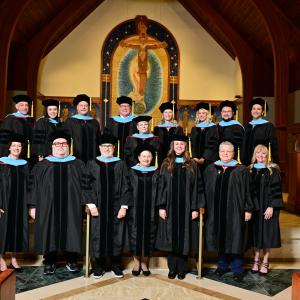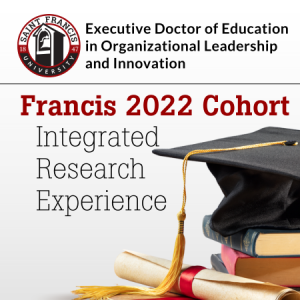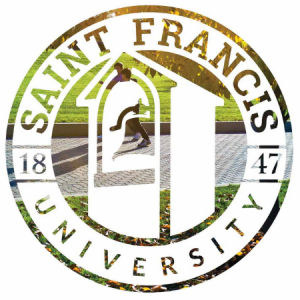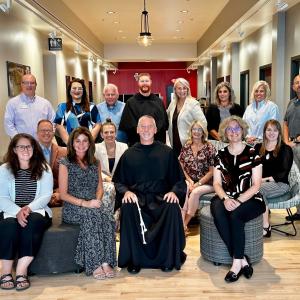
Executive Doctor of Education in Organizational Leadership and Innovation
Chart your Leadership Journey with an Ed.D. Tailored to your Professional Path
51-credits, 32 months, Hybrid Delivery
Saint Francis University's Executive Doctor of Education in Organizational Leadership and Innovation is a strategic and transformative 32-month program with an interdisciplinary focus on leadership. This Ed.D. path is designed for individuals who seek to be intellectually challenged and to prepare themselves to excel in their careers with their current employer or to pivot to a new career in another discipline.
- Online courses plus in-person residencies give you the most impactful learning experience.
- 51-credit program features an interdisciplinary leadership core coupled with focused profession-specific concentrations.
- Ideal for emerging leaders in any field including business, education, healthcare, government and non-profit sectors.
- Benefit from rich interdisciplinary exploration with people in all walks of life while gaining disciplinary depth in your own industry.
- Transfer-friendly policy shortens completion time and increases affordability. Transfer evaluation up to 21 credits.
- Integrated dissertation work means no heavy research burden at the end.
Our Ed.D. program has professional discipline concentrations aligned with business, education, healthcare, and other industry paths.

Relevant
research-based, doctoral-level program designed for working professionals

Impactful
online courses coupled with in-person residencies for optimal impact

Aligned
concurrent dissertation and coursework can be completed within 32 months

Important Deadlines
The next cohort begins in Fall 2026
- Applications Open: September 15, 2025
- Early Consideration: May 15, 2026
- Application deadline: July 15, 2026
- Rolling admissions until cohort is full or application deadline.
- Virtual Informational sessions monthly: Fall 2026 Prospective Student Webinars
Professional Discipline Concentrations
Incoming Ed.D. students will be able to incorporate a focused professional track to complement the interdisciplinary leadership and innovation core.
Professional Discipline Concentrations:
- Leadership & Innovation
- Business & Leadership
- School Superintendent
- Educational Leadership
- Health and Medical Leadership
- Doctoral Degree Completion
- Second Doctoral Degree
Transfer-friendly pathways with no additional credits required! (See FAQ section below for details)
Leadership and Innovation Concentration (15 Credits)
This overarching concentration offers students an enhanced ability to lead complex organizations in business, education, healthcare, non-profit, and public service fields with the aim of improving efficiency, effectiveness, and/or competitive advantage.

Business Leadership Concentration (15 Credits)
This concentration is designed to welcome students directly from business masters degree programs, and award transfer credit into the Ed.D. program for those who have earned more than 30 graduate credits.

School Superintendent Concentration (15 Credits)
This concentration is intended to be a seamless program for evolving K-12 leaders to complete their School Superintendent /Intermediate Unit Executive Director Letter of Eligibility Certification, and then move directly into the Ed.D. program.

Educational Leadership Concentration (15 Credits)
This concentration is designed for aspiring and current educational leaders like principals, reading specialists, special education supervisors, or other such leadership roles who seek to add the doctorate degree title to their portfolio in addition to their leadership certifications.

Health and Medical Leadership Concentration (15 Credits)
This concentration is for aspiring and current leaders in health and medical sectors, who seek to add an interdisciplinary research doctoral degree to their specialized health or medical training and degrees

Doctoral Degree Completion Concentration (21 Credits)
Designed for students who choose to restart their doctoral studies and complete this Ed.D. program. This program offers the unique benefit of recognizing doctoral level coursework already completed.

Second Doctoral Degree Concentration (21 Credits)
This concentration is designed for students who choose to add a research doctoral degree to their previous doctoral degree(s). This could be someone earning a medical, legal, pharmacy, divinity, or other professional degree, who now seek a leadership and innovation research doctorate.

Student Testimonials
Networking: "The best experiences are when you can learn from colleagues with diverse backgrounds, so the cohort structure was important to me."
Chip Iglesias, Doctoral Candidate
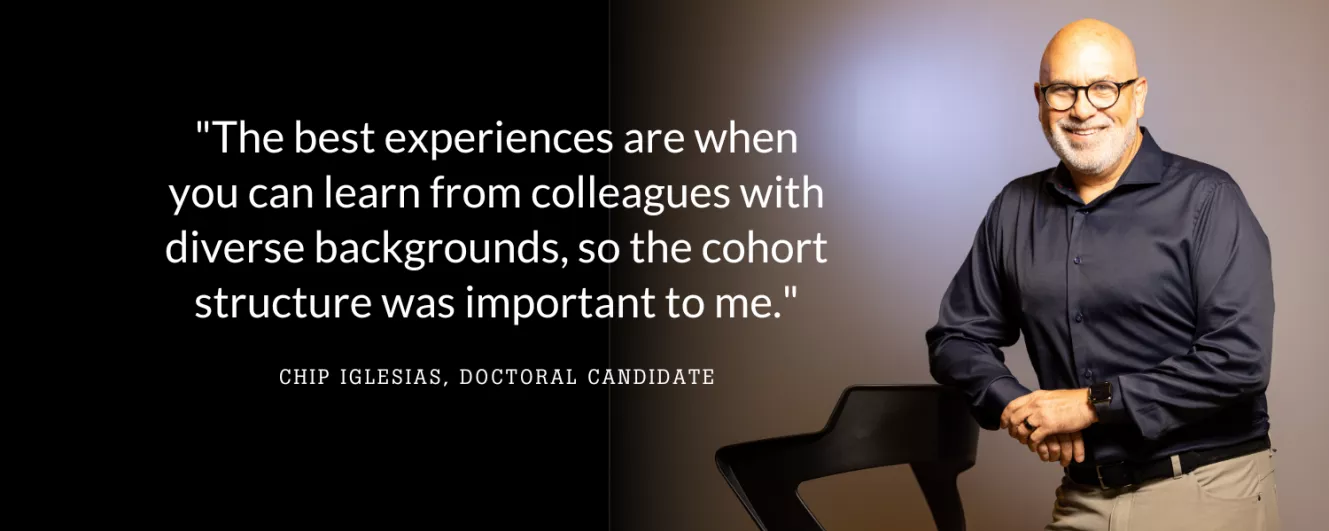
Flexibility: "Saint Francis' hybrid model is the perfect fit. Online coursework allows me to schedule around my kids' soccer games and dance practices."
Allison Ritchey, Doctoral Candidate
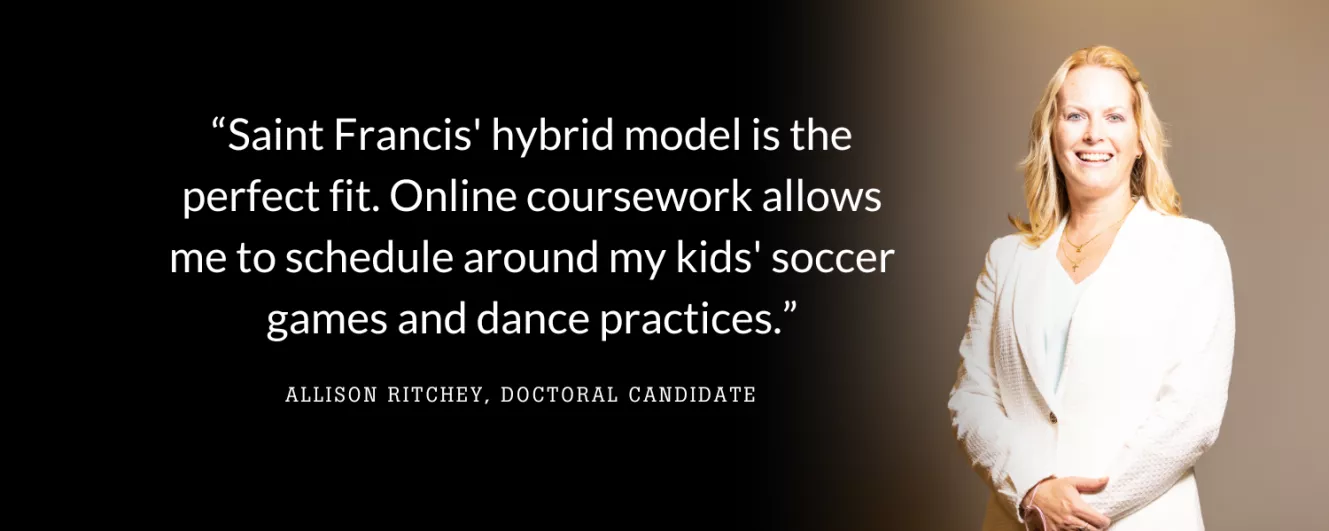
Impactful: "Being a middle school teacher, the Ed.D. afforded me advancement in leadership and the ability to reach my students more effectively."
Pamela Sprigler, Doctoral Candidate
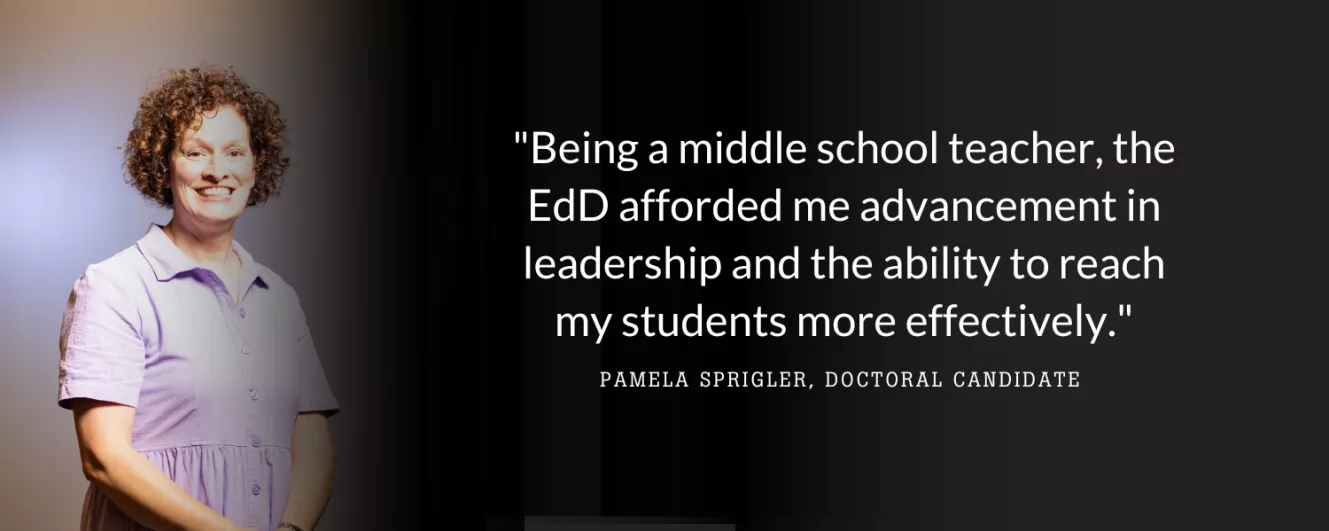

The SFU Executive LEARNING EXPERIENCE
Leadership Education the Saint Francis Way
- Structured for working professionals who want to study online yet enjoy the synergy of in-person collaboration.
- Ideal program for individuals looking to serve in leadership roles in business, education, healthcare, non-profit, and public service fields.
- Integrated dissertation work throughout the curriculum provides a better schedule fit for professionals.
- Online courses and collaborative cohort sessions, coupled with 8 in-person extended weekend residencies in Altoona, Pennsylvania.
Ethical Leadership is a Powerful Change Agent
While typical organizational leadership programs focus on the core skills needed to lead an organization, this unique program goes far beyond the basic leadership curriculum.
Our doctoral-level executive leadership program:
- accelerates, educates, and guides the development of leaders who actively encourage creative and value-based thinking in their institutions.
- builds upon strategic planning, environmental evaluation, change management, and leadership methodologies.
- fosters abilities to create an environment of innovation through cultural change, outside-the-box thinking, strategic and disruptive innovation, and leadership agility.
CURRICULUM & COURSES
What You’ll Learn in this Doctorate Program
The Executive Doctor of Education (Ed.D.) in Organizational Leadership and Innovation is a unique degree program that provides leaders with the capabilities to lead an organization with strategic innovation and sustainability in a competitive global economy. Students walk away with an enhanced ability to lead complex organizations in business, education, healthcare, non-profit, and public service fields with the aim of improving efficiency, effectiveness, and/or competitive advantage.
Program Snapshot
- Fully online courses with an extended weekend residency requirement each semester (8 total residencies in Loretto, Pennsylvania)
- 51 total credits (Transfer evaluation up to 21 credits)
- 32-months anticipated completion time
- Cohort enrollment
- Integrated dissertation work
- Program Cost $51,000 (includes all related academic resources and residency costs (except travel and hotel)
The Student Experience
Participants progress as part of a cohort. Courses are online and highly collaborative. Support is offered for those who are not familiar with online learning platforms. Each cohort will be assigned a coach/mentor to work with them throughout the program. For a few days each semester, cohorts will gather in person for a residency experience in Altoona, Pennsylvania. A practicum experience, an integrated dissertation process, and a reflective progress journal allow participants to apply knowledge gains within their organizations in real-time.
Degree Awarded
Successful graduates in our Organizational Leadership and Innovation program earn an Executive Doctor of Education (Ed.D.).
Curriculum Overview
Building on the strength of our current leadership portfolio, this program is connected to a clear tradition of research and theory woven throughout a leadership practicum.
The program begins with an introduction to leadership theory, spends time focusing on organizational development, change theory, ethics, and leadership in a global world.
Course Catalog - 25/26 | Plan of Study
Program Core Competencies
- Apply the theories and principles of organizational leadership and innovation to advance your field of study through research.
- Demonstrate how leadership theory and practices are linked to practical applications in your field of study.
- From an executive leadership perspective, apply the principles of global policy and ethics to a practical organizational dilemma.
- Demonstrate proficiency in ethical executive leadership decision-making.
- Create an organizational strategy and/or innovation that advances the organization in a global market.
- Articulate to internal and external stakeholders, an organizational strategy that addresses organizational development, financial stability and growth, and executive leadership decision-making in a globally diverse and inclusive organization.
Ed.D. Program Admission Timeline
Admission Process
Application Materials
- Online application -- complete and submit the free online application for consideration of admission.
- Two Letters of Recommendation from professional contacts. One letter must be from the applicant's immediate supervisor expressing support for the applicant to enroll in the program and to make a full commitment upon acceptance.
- Essay -- no more than 1000 words on why achieving this degree is important to you from a leadership perspective and the competencies and experiences you bring to and hope to gain from this program.
- Professional Resume/Curriculum Vitae (CV).
- Official baccalaureate and graduate-level transcripts; minimum master's level GPA equivalent of at least 3.0 on a traditional 4.0 scale.
Transfer Credit Evaluation: A maximum of 15 graduate-level credits may be transferred upon review for most concentrations, depending on chosen concentration and the equivalency of transfer credits to program requirements.
Up to 21 credits may be transferred upon review for students who are seeking a second doctoral degree or have credits from another doctoral program they did not complete. An unofficial credit evaluation will be processed with unofficial transcripts. Official transcripts are required for the formal and final transfer credit evaluation, which is conducted once a complete application is submitted.
Application Deadline
Priority will be given to those applications submitted by May 1st. Applications will be reviewed on a rolling basis until the cohort is deemed fully enrolled. Maximum enrollment for the cohort is 25 students.
Waitlist: A program waitlist will be inclusive of qualified applicants in the event the application pool far exceeds the cohort maximum.
Application Review Process
- The Admissions Review Committee (ARC) consists of five voting members:
- Doctoral Program Director
- Representative from the School of Health Sciences and Education
- Representative from the Shields School of Business
- Representative from the School of STEAM
- Representative from the Franciscan Community
- Five members of the Admissions Review Committee will review all submitted and completed applications. Accepted, denied and waitlist letters will be processed and mailed out promptly following the decisions of the committee along with additional information and instructions on how to make a tuition deposit to confirm a seat in the cohort.
Acceptance Process
- Official acceptance letters will be processed and mailed out promptly following the decisions of the Admissions Review Committee along with additional program information and instructions on how to make your tuition deposit.
Tuition Deposit Due - 30 days from date of acceptance letter
- Upon receipt of acceptance letter, a non-refundable tuition deposit of $500 must be paid to secure a seat and confirm commitment to the cohort. Full deposit will be applied to the first semester tuition. Failure to submit the required deposit is a risk of losing a seat in the current cohort.
- Students accepted after May 1st will be required to submit a non-refundable tuition deposit within 14 days of acceptance letter.
- Once the deposit is received, additional information will be communicated by the Program Director, including detailed information regarding registration.
Registration for Courses Process
- The Program Director will assign an advisor to each student. The advisor will assist students with accessing SFU login information for completing the Registration Agreement Form. This form must be completed every semester. Every student is responsible for this form and paying tuition balance before the Registrar’s Office will add students to the roster of upcoming courses. This will keep the cohort progressing together through the program.
- An introductory Canvas course will be offered to introduce the cohort to research standards, online resources, information about academic accommodations, etc.
Saint Francis University, including the Ed.D. program, is accredited by the Middle States Commission on Higher Education, 3624 Market Street, Philadelphia, PA 19104; (267-284-5000). The MSCHE is an institutional accrediting agency recognized by the U.S. Secretary of Education and the Council for Higher Education Accreditation (CHEA). www.msche.org

Benefit from our Experienced Faculty
Faculty in our doctoral-level executive leadership program will be comprised of a blend of talented full-time academicians and experienced practitioners with a proven track record in applying organizational leadership theory. Our faculty are experienced in teaching executive-level professionals within an online environment.
 Program Contact: Dr. Tricia McFadden, Director of the Executive Doctor of Education Program, 814.471.1163, TMcfadden@francis.edu.
Program Contact: Dr. Tricia McFadden, Director of the Executive Doctor of Education Program, 814.471.1163, TMcfadden@francis.edu.
Meet Our Faculty
FAQs
Frequently Asked Questions About the Executive Doctor of Education Program at Saint Francis University
-
Transfer Credit Evaluation:
A maximum of 15 graduate-level credits may be transferred upon review for most concentrations, depending on chosen concentration and the equivalency of transfer credits to program requirements.
Up to 21 credits may be transferred upon review for students who are seeking a second doctoral degree or have credits from another doctoral program they did not complete. An unofficial credit evaluation will be processed with unofficial transcripts. Official transcripts are required for the formal and final transfer credit evaluation, which is conducted once a complete application is submitted.
-
There will be 8 in-person extended weekend residencies in Altoona, Pennsylvania throughout the program with one each semester. The goal of the residencies is to prepare you for and accompany you on your doctoral journey. Each residency will also allow you to connect with other students and develop a network of like-minded professionals.
Key goals of the residency program include:
- refine the skills necessary to be a doctoral student and scholarly practitioner
- receive a variety of support services including technical, administrative, and academic support
- foster and build a sense of camaraderie with your doctoral cohort
- acquire the skills necessary to conceptualize, design, and carry out applied research
- provide real-time support and assignments relevant to the simultaneous completion of coursework and the dissertation
Specifics on the location and dates will be released shortly for the first cohort. Fees for your travel to/from your residency requirement, a majority of the meals, and lodging are at your own expense. Block room rates will be available to students. Students will be required to be in Altoona, Pennsylvania for the extended weekend residency.
-
If you are not able to continue with the cohort in which you started, you may request an approved one-time step out. Students can then join the next cohort group at the point in which they stepped out of the previous cohort. There is a fee associated with program step-out.
-
If you are not able to complete the dissertation in the time frame of the cohort, you will register for DISS905 Dissertation Continuation for zero credit. There will be a fee of $1,000 to continue each semester. The maximum time for program start to dissertation is 5 years.
-
Yes. The program is carefully designed for working adults. Coursework is mostly completed online along with dissertation work throughout the curriculum. We recommend you discuss with your employer the need for time off related to residency requirements. Residency dates will be published approximately 5 months in advance for your planning purposes.
-
Unfortunately, no. This program is classified as fully online and does not meet the criteria for F1 Visa holders.
Transfer Credit Evaluation:
A maximum of 15 graduate-level credits may be transferred upon review for most concentrations, depending on chosen concentration and the equivalency of transfer credits to program requirements.
Up to 21 credits may be transferred upon review for students who are seeking a second doctoral degree or have credits from another doctoral program they did not complete. An unofficial credit evaluation will be processed with unofficial transcripts. Official transcripts are required for the formal and final transfer credit evaluation, which is conducted once a complete application is submitted.
There will be 8 in-person extended weekend residencies in Altoona, Pennsylvania throughout the program with one each semester. The goal of the residencies is to prepare you for and accompany you on your doctoral journey. Each residency will also allow you to connect with other students and develop a network of like-minded professionals.
Key goals of the residency program include:
- refine the skills necessary to be a doctoral student and scholarly practitioner
- receive a variety of support services including technical, administrative, and academic support
- foster and build a sense of camaraderie with your doctoral cohort
- acquire the skills necessary to conceptualize, design, and carry out applied research
- provide real-time support and assignments relevant to the simultaneous completion of coursework and the dissertation
Specifics on the location and dates will be released shortly for the first cohort. Fees for your travel to/from your residency requirement, a majority of the meals, and lodging are at your own expense. Block room rates will be available to students. Students will be required to be in Altoona, Pennsylvania for the extended weekend residency.
If you are not able to continue with the cohort in which you started, you may request an approved one-time step out. Students can then join the next cohort group at the point in which they stepped out of the previous cohort. There is a fee associated with program step-out.
If you are not able to complete the dissertation in the time frame of the cohort, you will register for DISS905 Dissertation Continuation for zero credit. There will be a fee of $1,000 to continue each semester. The maximum time for program start to dissertation is 5 years.
Yes. The program is carefully designed for working adults. Coursework is mostly completed online along with dissertation work throughout the curriculum. We recommend you discuss with your employer the need for time off related to residency requirements. Residency dates will be published approximately 5 months in advance for your planning purposes.
Unfortunately, no. This program is classified as fully online and does not meet the criteria for F1 Visa holders.
FAQ About Program Costs
-
The program costs $51,000 in total and tuition charges are semester-based ($6,375 per semester - Fall, Spring, Summer). Loans are available to students. The Office of Financial Aid is available to answer questions about student loans. Call 814-472-3010.
-
Only loans are available to students. Our professional Financial Aid staff will be happy to assist you in understanding how to apply for loans. Staff is available by email at finaid@francis.edu, phone 814-472-3010, and for an online meeting.
-
A $500 non-refundable tuition deposit is required to secure a seat no later than sixty days prior to the start of the semester. Students accepted after May 1st will be required to submit a non-refundable tuition deposit within 14 days of acceptance letter. This deposit will be applied towards your first-semester tuition.
-
Students should prepare to pay the costs associated with the 8 in-person extended weekend residencies and practicum requirements each semester (inclusive of transportation, some meals, lodging in Altoona, Pennsylvania). There are no fees for books or materials. Students will pay a one-time $125 graduation fee.
The program costs $51,000 in total and tuition charges are semester-based ($6,375 per semester - Fall, Spring, Summer). Loans are available to students. The Office of Financial Aid is available to answer questions about student loans. Call 814-472-3010.
Only loans are available to students. Our professional Financial Aid staff will be happy to assist you in understanding how to apply for loans. Staff is available by email at finaid@francis.edu, phone 814-472-3010, and for an online meeting.
A $500 non-refundable tuition deposit is required to secure a seat no later than sixty days prior to the start of the semester. Students accepted after May 1st will be required to submit a non-refundable tuition deposit within 14 days of acceptance letter. This deposit will be applied towards your first-semester tuition.
Students should prepare to pay the costs associated with the 8 in-person extended weekend residencies and practicum requirements each semester (inclusive of transportation, some meals, lodging in Altoona, Pennsylvania). There are no fees for books or materials. Students will pay a one-time $125 graduation fee.


